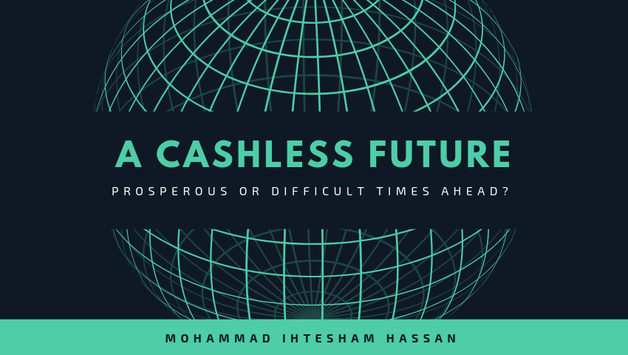ECONOMICS STUDY CENTER, UNIVERSITY OF DHAKA
|
Mohammad Ihtesham Hassan Bartering was the first known method of humanity invented for exchanging goods or services. However, simple problems such as comparing perishable and nonperishable items, or how many cows should you exchange for how much clothes eventually paved way for the development of newer methods. Commodity money, i.e. money that has intrinsic value such as gold and silver coins then came into being. This eventually evolved into the system of representative money i.e. paper money. The first banknotes in Europe were issued by Stockholms Banco, a Swedish bank in 1661; four centuries forward, Sweden is on its way to becoming the first cashless country in the world in 2023. Findings from the World Payments Report 2018 show that global digital transaction volumes grew at 10.1% in 2016 to reach a staggering 482.6 billion. Emerging economies of Asia (25.2%) and Central Europe Middle East and Africa (CEMEA) (17.1%) were the main driving force behind the growth. Such huge growths were possible because of governments’ initiatives to increase financial inclusion and increasing adoption of mobile banking services. With technological upgrades, credit cards, mobile money wallets and online payment systems such as PayPal assist in making our lives a lot easier. Findings from a PayPal report called ‘Digital Payments: Thinking beyond Transactions’, where 4000 consumers and 1400 merchants of seven countries- China, India, Hong Kong, Singapore, Thailand, Philippines, Indonesia were surveyed, 69% of the respondents cited convenience as the number one reason for using digital payments frequently. Carrying cash can be a headache at times- be it from risk of theft, not having change or even forgetting what you spent your money on, the list goes on. 38% said secure transactions was why they preferred using digital payments while 35% said discounts and promotional offers they received acted as a push factor in opting for digital payments. Even businesses and governments are welcoming the transition to a cashless society because it makes transactions more transparent, simultaneously increasing security. Furthermore, there is a lesser chance of tax evasion, counterfeiting is prevented and illegal activities and black markets are curbed to certain degrees. Sweden saw a significant decline in bank robberies in recent years, as there is no cash in most Swedish banks anymore. Even sole proprietors feel safer without having any visible cash. Other countries such as China have seen tremendous growth in cashless payment in recent years. The most popular payment mediums are through the AliPay and WeChat pay apps, created by tech giants Alibaba and Tencent respectively. Mobile payments saw an aggregate amount of $5trn in 2016. According to a Massachusetts Institute of Technology study, results have shown mobile payment service was the reason behind bringing two percent of Kenyan household out of extreme poverty, which is equivalent to an approximate 194,000 people. 80% of the total amount of registered transactions are done via digital payments in South Korea. It is aiming to become a completely cashless country by 2020. Other European nations like the Scandinavian countries and Belgium are also on track towards removing cash payments altogether. In fact, Danmarks Nationalbank, Denmark’s central bank stopped printing the Danish krone in 2016 and subsequently the printing of their currency has been outsourced. Canada’s citizens own more than two credit cards per person. 90% of the Canadian population prefer digital transactions, while on average 70% usually opt for banking cards while paying. According to a PayPal survey, 56% of the mass prefer to use online wallet than to carry cash. The country is so keen on embracing the cashless system that it stopped producing the 1 cent coin in 2013 after it was found the material value was worth more than its face value and it was replaced by new currency due to lack of demand. On the other side of the coin, we find first world countries like Japan and Germany where even though the governments are encouraging and providing incentives for switching to electronic payments, people still remain skeptical. Major concerns are risk of identity theft, such through phishing and spam emails, online frauds and hacking. Usage of cash remains popular in German cafes and small restaurants which contrarily refuse to accept banking cards. Other reasons for not giving into the cashless trend include the spending trap of using banking cards. Findings from the article, ‘Cashless transaction: Modes, advantages and disadvantages’ quotes as follows: ‘According to behavioral finance theorists, the pain of parting with money is felt more acutely if you use physical cash instead of a card. Hence, using cash instead of cards or mobile wallet acts as a natural bulwark for people who find it difficult to control their spending. This is the reason that people could end up overspending, throwing their budgets into disarray.’ However, the most important backdrop against going cashless is ultimately the discrimination against those without any bank account, undocumented immigrants and the senior citizens. However Philadelphia is taking a stance against the cashless future and the mayor has already signed into a law which ‘prohibits stores and restaurants from refusing to accept cash, calling it “unlawful discrimination”’ according to an AFP report. While third world countries like Bangladesh have a long way to go before we end up in such debates, but the trend shows the number of digital transactions are also on the rise here, courtesy of mobile banking and lucrative offers from the banks regarding credit cards. Yet, for countries like Sweden, children who are as young as 7 years old can now issue debit cards. As we are entering into the cashless era, in these advanced economies, in the near future, the only time the children will ever get to printed money will be in museums or if they google it. Sources: 1.https://www.thedailystar.net/business/global-business/news/philadelphia-says-no-totally-cashless-future-1713157 2.https://economictimes.indiatimes.com/wealth/spend/going-cashless-is-it-good-for-you/articleshow/55908649.cms?from=mdr 3. https://www.indiatoday.in/fyi/story/cashless-countries-belgium-denmark-uk-france-kenya-black-money-352348-2016-11-16 4.https://medium.com/tech-tales/could-these-5-countries-be-cash-free-by-2020-45a63762acaf 5.https://interestingengineering.com/sweden-how-to-live-in-the-worlds-first-cashless-society 6.https://worldpaymentsreport.com/wpcontent/uploads/sites/5/2018/10/World-Payments-Report-2018.pdf 7.https://www.paypalobjects.com/digitalassets/c/website/marketing/global/shared/global/media-resources/documents/PayPal_Asia_Research_Report_Digital_Payments.pdf
1 Comment
Mohammad Taki
4/3/2019 12:04:26 pm
Good one bro
Reply
Leave a Reply. |
Send your articles to: |




